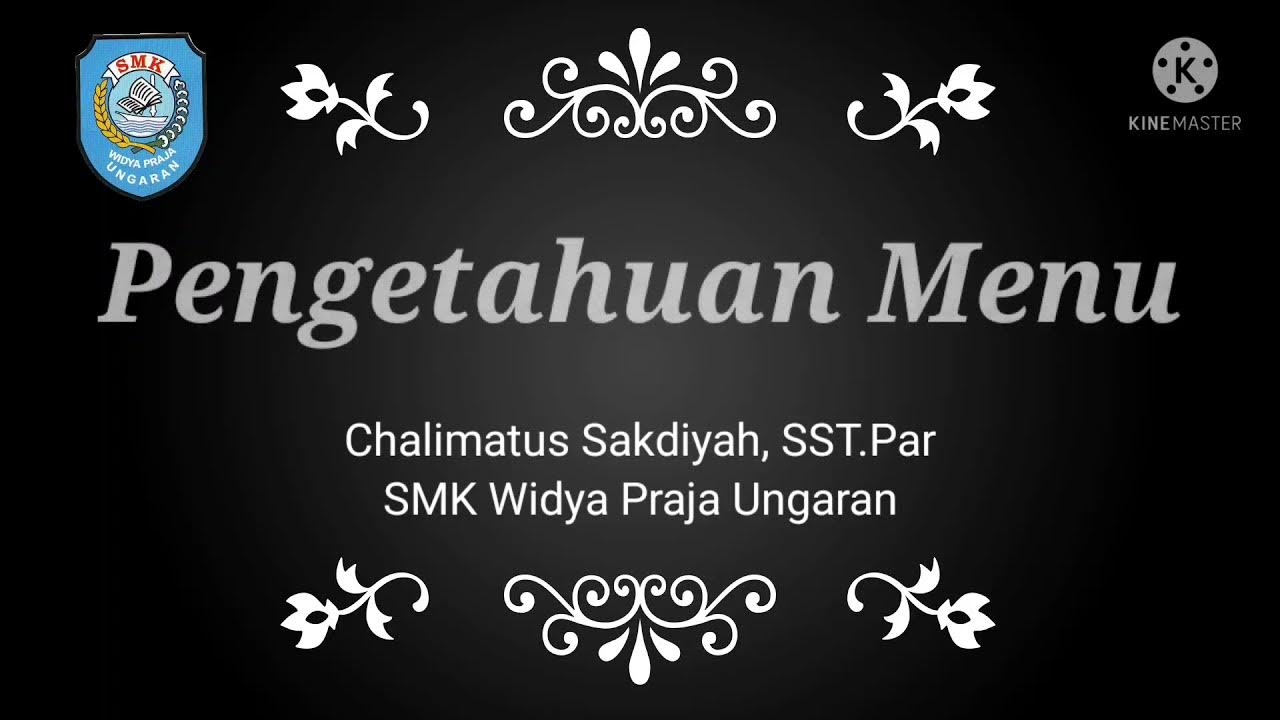TLE COOKERY 9 QTR 4 LESSON 1 DIFFERENT TYPES OF DESSERT (WEEK 1)
Summary
TLDRThis video explores the delightful world of desserts, highlighting their significance in completing meals and offering a sense of closure. It covers various types of desserts, including fruit-based options, cheeses, gelatins, custards, cobblers, and frozen treats like ice cream and sherbet. The video emphasizes the pleasure derived from sweet foods, how they balance flavors in a meal, and their potential for creativity in the kitchen. Through an engaging discussion of dessert characteristics and examples, it invites viewers to explore the joy and versatility of sweet treats in culinary experiences.
Takeaways
- 😀 Dessert is the final course of a meal, leaving a lasting impression on the dining experience.
- 😀 A bad dessert can ruin the meal, while a good one enhances the experience and completes the meal.
- 😀 Eating desserts stimulates the brain’s pleasure centers due to the sweet taste, providing a rewarding sensation.
- 😀 Desserts provide an opportunity to be creative with flavors and textures that you typically don’t experience in other foods.
- 😀 Different desserts can offer new and exciting flavors, from the simple and nutritious fruit desserts to more complex ones like custards and jellies.
- 😀 Fruit desserts are simple, nutritious, and easy to prepare, offering natural sweetness and an appetizing aroma.
- 😀 Cheese-based desserts vary depending on the milk used (cow, goat, sheep), with types ranging from soft to hard cheeses.
- 😀 Gelatin desserts are versatile, easy to prepare, and economical, with examples like fruit gelatines, jello shots, and panna cotta.
- 😀 Custard-based desserts, made with milk, cream, and egg yolks, offer a rich and creamy texture and can be served in various forms, like tarts or pies.
- 😀 Ice cream, sherbet, and sorbet are frozen desserts with unique textures and flavors, with ice cream containing milk and cream, while sorbet relies on fruit juice and water.
Q & A
What is the main focus of the lesson in the transcript?
-The main focus of the lesson is to introduce and explore different types of desserts, their characteristics, and the reasons for consuming them, such as the pleasure they provide and their ability to balance and complete a meal.
Why is dessert considered an important part of a meal?
-Dessert is considered important because it balances out the meal, provides closure, and is often the last course served. It offers an opportunity to experience different flavors and textures that cannot be found in other foods like vegetables or meats.
What role do specialized receptors in the mouth play when eating sweet foods?
-Specialized receptors in the mouth detect sugar molecules in sweet foods and activate a signaling pathway that stimulates the brain, producing a pleasurable feeling.
What is the significance of fruit in desserts?
-Fruit is a popular dessert ingredient because it is nutritious, appetizing, easy to prepare, and offers a natural sweetness with a pleasant aroma, often served chilled for better taste.
What are the three general types of cheese, and how do they differ?
-The three general types of cheese are: soft cheese (e.g., cottage cheese, cream cheese), which is spreadable with a mild flavor; semi-hard cheese (e.g., cheddar, edam), which is firm and crumbly; and hard cheese (e.g., parmesan, Romano), which is dry, crumbly, and often used for grating.
What are some examples of popular gelatin-based desserts mentioned in the transcript?
-Popular gelatin-based desserts include Christmas gelatine, fruit gelatine, jello shots, gelatine cakes, and panna cotta.
What are the main ingredients in custard, and what are the types mentioned?
-The main ingredients in custard are milk or cream and egg yolk. The transcript mentions two types: soft custard (e.g., caramel custard, leche flan) and baked custard (e.g., egg custard tarts, raspberry custard).
What distinguishes fruit cobblers from fruit pies?
-Fruit cobblers are not fruit pies; they have a depth of two or three inches and are topped with biscuit dough rather than pie crusts. They can be served hot or cold.
What are the key ingredients in making ice cream?
-Ice cream is made from a smooth mixture of milk, cream, sugar, flavorings, and sometimes eggs. It is frozen to create a creamy texture.
How do sherbet and ice differ in terms of ingredients and texture?
-Sherbet contains milk and cream, and sometimes egg whites, which give it a creamier texture than sorbet. Ice, on the other hand, is made from fruit juice, water, and sugar, and is typically firmer and more crystalline in texture.
Outlines

Cette section est réservée aux utilisateurs payants. Améliorez votre compte pour accéder à cette section.
Améliorer maintenantMindmap

Cette section est réservée aux utilisateurs payants. Améliorez votre compte pour accéder à cette section.
Améliorer maintenantKeywords

Cette section est réservée aux utilisateurs payants. Améliorez votre compte pour accéder à cette section.
Améliorer maintenantHighlights

Cette section est réservée aux utilisateurs payants. Améliorez votre compte pour accéder à cette section.
Améliorer maintenantTranscripts

Cette section est réservée aux utilisateurs payants. Améliorez votre compte pour accéder à cette section.
Améliorer maintenantVoir Plus de Vidéos Connexes

#SarapanNikmat Pakai Frisian Flag Susu Kental Manis Full Cream GOLD – V1A

KADIKÖY'DE LEZZET PEŞİNDE (Hesaplar Senden Bölüm 5) - Ayaküstü Lezzetler

🍴 Le vocabulaire du restaurant en Français

Enhancing Cancer Care: Denvax Immunotherapy for Comprehensive Treatment and Prolonged Life

İSTANBUL'UN EN LEZZETLİ SOĞUK BAKLAVICILARI !

Pengetahuan Menu (Tata Hidang)
5.0 / 5 (0 votes)
